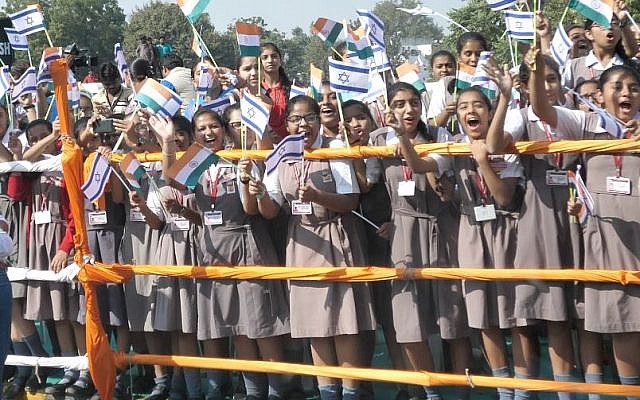PM treated to a reception rarely seen by Israeli leaders anywhere; Foreign Ministry director says he’s never seen any like it

MUMBAI, India — In Ahmadebad, tens of thousands of people lined the street, some waving Israeli flags, as Prime Minister Benjamin Netanyahu sped past, whizzing by massive billboards with his and Indian counterpart Narendra Modi’s faces plastered on them.
In rural Dev Dholera, curious farmers and others craned their necks to catch a glimpse of the prime ministers, and hundreds of young entrepreneurs and business people cheered the leaders like rock stars.
In Sabarkantha, villagers waved at the prime ministers’ helicopters as they came in to land in a former forest that had been cleared to make way for a helipad. Dancers in traditional dress did flips, and farmers told of how many rupees they had made after training at an Israel-funded agricultural center.
Wednesday’s displays of love for Israel and its leaders — some of them seemingly carefully choreographed, some apparently spontaneous — drove home the budding bromance between Netanyahu and Modi, a love affair both hope will also bloom into a tighter business and strategic relationship.
For Modi, who cut his teeth in politics as chief minister of Gujarat from 2001 to 2014, the visit was seen as personally significant, and while there had been signs welcoming Netanyahu in Delhi, Agra and Mumbai, they were smaller than the massive billboards in the northwestern Indian state.
While in other places, Netanyahu’s motorcade was at best a curiosity, in Gujarat, crowds lined streets, and songs were played in Hebrew in some places.
Foreign Ministry director Yuval Rotem said he had never seen a reception like that received by Netanyahu in all of his years in the foreign service. Netanyahu, too, said he was “moved” by the Gujaratis’ apparent infatuation with him and with Israel, and praised Modi at every opportunity.
“Modi… is catapulting it [India] into the future as one of the world’s great powers. And he is doing it through the power of innovation,” Netanyahu said during a speech.
Earlier in the day, he paid a lightning visit to the home of another former Gujarat resident, Mahatma Gandhi, praising the father of modern India as an “inspiration.”
Capping off the day on his way to Mumbai for the last leg of his trip, Netanyahu announced that he had managed to get the Spike anti-tank missile deal between the Israeli arms manufacturer Rafael and India back on track after his talks with Modi, though it was not yet clear if the deal would still carry the $500 million price tag it did before it was nixed in the lead-up to the visit.
The news of the Rafael deal quickly overshadowed the rest of the day’s events and even much of the trip’s official agenda, which is intended to broaden Israel and India’s economic relationship beyond arms and gem sales.
But before the prime minister broke the news, he and Modi highlighted innovation and agriculture, two fields in which India and Israel are hoping to expand collaboration.
Inside a well-groomed campus surrounded by dusty fields, irrigation ditches and emaciated cows in Dev Dholera, outside Ahmadebad, the two leaders inaugurated the iCreate center, an innovation hub that is part of Modi’s Start-up India scheme.
Netanyahu gifted Modi a mobile water purification buggy of the type the two had ridden in on an Israeli beach in July. He also announced the winners of a pilot project meant to match up Indian and Israeli tech companies that can complement each other, part of the $40 million Israel-India Innovation Initiative Fund.
Entering a large tent after touring some of the products developed by iCreate, the two received a standing ovation and Netanyahu was treated to raucous rounds of applause that have become a rarity for the Israeli leader beset by domestic troubles at home.
“There is an enthusiasm in India for what Israel is doing,” said an executive from a major conglomerate involved in expanding ties with the Jewish state who attended the event.
Hilly Hirt, deputy director of the Pears Program for Global Innovation, which is involved in developing the relationship, said the two countries are a “natural fit,” pointing to Israel’s experience in developing agricultural innovations that could aid a relatively poor country like India.
But one need only look at the Israeli and Indian press coverage of the visit to understand why it will take more than water-cleaning ATVs to change the calculus of the relationship. Media in the subcontinent Wednesday focused on Netanyahu and Modi’s speeches, while in Israel, push notifications rang out only when the return of the Rafael deal was announced.
Netanyahu’s last stop in Gujarat before leaving to Mumbai was a high-tech nursery in another rural area outside Ahmadebad.
In a tent next to hothouses where Indian farmers learn to use Israeli technologies via the Mashav aid program, both leaders heard from locals who said they were making millions of rupees a year after training in the program.
As the two PMs returned to the helicopters to go back to the airport, a crowd of people was held back by a police cordon, waving at the delegation but unable to take part in the spectacle.
The scene was a microcosm of the complications facing the countries in trying to scale the tiny Jewish state’s innovations to the Indian giant’s massive challenges.
The notables boarded the choppers, underlining both countries’ desire to diversify contacts with the reality of a trade relationship built on expensive military machinery. And leaving the hothouses — a proud point of ties, lucrative for some, and essential for India’s development — much of the Asian giant’s population appeared poised to be left behind.



Leave a Reply
You must be logged in to post a comment.